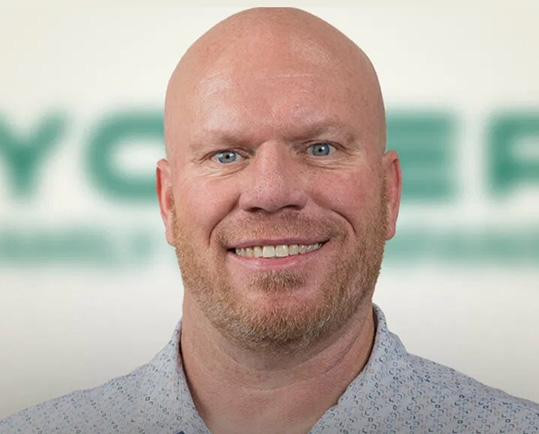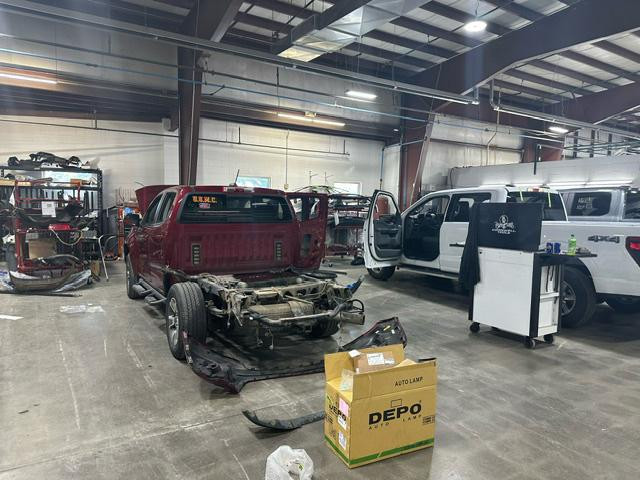A conventional take on body shops is you either churn vehicles through DRP-based, insurers-focused work, or you be agile, nimble and indie with a slew of new ideas to serve locals.
Why not two cupcakes?
Two Abra Auto Body locations, one each in Greeley and Fort Collins, CO, and the Carriage Shoppe in Fort Collins, are testing the notion that anyone, anywhere, anytime, any job, can raise customer experience. Abra falls under the Driven Brands umbrella, while Carriage Shoppe is an independent.
All three are part of the Yoder Family of Companies, a family-owned automotive services group that also includes auto dealerships, repair, fleet and commercial services, a finance arm, metal fabrication and leasing space to an outside body shop operator.
Yoder is on its third generation of in-house ops and its oldest element hearkens back more than a century, when it was still fixing horse-drawn buggies. It also includes a charitable giving arm.
Interactive Customer Relationships
Five years ago, the Yoders brought on Vice President of Collision Operations Micah Elsom. Elsom has some two decades in the industry, and yes, his dad owned a shop, in Texas.
 Micah Elsom.
Micah Elsom.
“The first question they asked me was, ‘What does a well-operated shop look like to you?’” Elsom said. It was about appearances -- gleaming floors, staff attire -- and back office, as well as end-to-end customer journeys.
“That’s where the momentum starts,” he said. “We’re intimately involved in whatever they want done, and try to give direction on what they might need.”
This means seeing the interaction as relational, not transactional. It’s not often you hear the words "empathy" or "body language" in a shop setting, but Elsom said these several times, talking with Autobody News.
“What does it feel like when they’re there, but also what does it feel like when they’re not there,” he said.
“We’re going to do DRP and get the volume; that’s the business part of it,” he said. “But I expect anybody who hits the floor is treated like gold -- best-in class, five-star service.”
A few parts of this: pre-washing cars after arrival and before final estimate, and washing all of them after work is done, maybe throwing in some waxing as well. Gratis buffing of scratches or banging out that tiny dent near the repair spot. Sometimes a headlight gets restored to better match the new one just installed.
“If we put a new one on and the other one is weathered, we’ll take care of [that].”
How MICEE Fit Into Collision Repair
It’s “things you don’t have to do,” he said.
The work begins before customers show up, in intention and culture-building.
Then it’s “something to ignite the process” -- transparent and comprehensive communication, addressing concerns and asking good questions -- “empathy in the moment, learning what they want to accomplish.”
It’s already stressful to need to be there, so make everything else smooth. “We don’t want the inconvenience to be an inconvenience,” he said.
Elsom’s approach flows from the highly Google-able idea of MICEE:
- Model the way
Inspire the vision
Challenge the process
Enable the action
Encourage the heart
Much of this corresponds to what managers and Elsom do. Are they enacting the purpose of the process at each point? Do they "inspire" and "encourage" in words and deeds, before and during, when things go well -- or not?
Staff can question -- "challenge" -- aspects of the work, and GMs have authority -- "enable" -- to solve inevitable issues. One once delivered a Tesla to a customer in Denver, 60 miles away, at the end of the workday.
“There’s a point where I step away, and I’d hate for it to go a different direction,” Elsom said. It’s akin to the “Toyota theory, where if one thing goes wrong, they go to it and stop everything.”
If customer service has lagged at any point, the shop moves on that.
Customers hear from Elsom’s people several times a week, by phone, email or text.
Everything runs off a schedule, with build-ins for vehicle drop-offs. Vehicle “triage” includes tons of photos, “mapping damage, finding new issues, meticulous disassembly,” an extensive process that’s “more than just estimating.”
New hires are told, “We’re grateful for your experience, we’re bringing you into our circle -- this is how we treat the customer,” Elsom said. They then shadow others their first week and are often cross-trained on the full process.
“It’s really my time that gets invested in this,” Elsom said. “Stating the expectations, what the process looks like, what we need to know.”
The shops’ customer satisfaction index -- monthly metrics to measure performance -- “has been exceptional the last couple years.”
Elsom uses the UpdatePromise software DRPs require and puts customer-pay jobs on it too. He can check it daily, and gets notified if something is amiss.
Experience Economics
More broadly, efforts fall under the "experience economy," a perspective seeing business as about a way to connect with customers viscerally, instead of services seen as a commodity where the low price always wins.
The experience economy has been around more than a quarter century. Think of early Starbucks, where coffee -- definitely something formerly about how much a cup cost -- became more about how people felt about the time spent there. It has spread through multiple industries.
Early in his career, working in his dad’s shop, Elsom’s body language was decidedly not what public-facing.
“He always tells me, ‘The first estimate you wrote and reviewed, your mother said you’re never going to get this,’” Elsom recalled. “My head was down, I read off the sheet … ”
Times have changed. The down-and-dirty part -- doing work well -- is a given. The emphasis becomes how customers evaluate the experience.
“There’s a technical expectation -- you’re the professionals, you’re gonna make it happen,” Elsom said. “But over time, customer service is the most valuable part.”














Paul Hughes